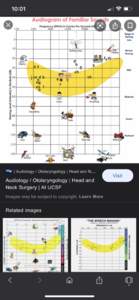Having trouble clearing the time to scan through so many posts.
Could someone encapsulate what happened so I can bookmark the post?
I am hoping the Tinnitus Talk Podcast goes over it at least.
It's a lot to parse through but my take:
--Frequency Therapeutics said in Phase 2a all groups improved word scores (including placebo). They attribute this, after reviewing records, to serious discrepancies between historical word scores and the pre-treatment baselines they got. It was widespread enough to include all groups. They suspect social media was used to pool data so people could figure out what was needed but also Frequency Therapeutics themselves publicly announced that they didn't want great word scores to eliminate the ceiling effect from Phase 1.
So, as far as word scores go, someone lied:
1) Phase 1 super responders
2) Frequency Therapeutics
3) The Phase 2a participants (as Frequency Therapeutics has now claimed).
-- The individual data has not been made available and so far the trial is still blinded.
-- As far as EHF audiogram results, there was no significant changes. This is very odd considering the word score changes in Phase 1 especially (unless you think those were the fakers).
Some possibilities here are (if you assume that Frequency Therapeutics isn't a fraud or that Phase 1 participants lied about word scores without the incentive to get into the trial which wasn't a requirement then):
-- People in Phase 2, maybe the same people, artificially depressed their EHF (which most people got right before the trial) to lower their PTA .
-- The drug didn't regrow OHCs but affected some other aspect of hearing (synapses-- unlikely imo, or IHCs, etc). Of these, IHCs actually makes sense embryologically since they develop first. It's not IT injections in general or "cleaning the round window" otherwise IT steroid injections would work chronically.
-- Some other obscure technical problem (e.g., EHF not uniformly calibrated across different centers).
Something else that just occurred to me too is that sudden hearing loss (except for ototoxicity) is less likely to produce as much EHF loss vs age-related hearing loss. Might be an interesting data point from the age-related arm.
-- Historically, you can't double word scores with placebo so I would say that's not happening here (again unless Phase 1 participants lied).
-- The fact that the "super responders" (genuine ones assumed) had minimal audiogram changes leads me to believe that something odd is happening like IHCs are regenerated first. It would actually make sense for people with genuinely terrible word scores to have more IHC loss because most often (except for certain ototoxic drugs, you lose OHCs first and then IHCs). The hypothetical solution to this would be to treat the IHCs first and then follow up with another treatment a bigger interval later (again assuming this is the case).
-- Frequency Therapeutics said rapidly repeating injections actually hurt the efficacy ("you don't walk on a seeded lawn"...) They will continue with single injections only they have said for now. The more doses, the less of an effect.
Personally, I'm most interested in the severe hearing loss group now because 1) they get one injection, 2) they have genuinely awful hearing.
The point has been made that "there couldn't be that many fakers, right?" and if Frequency Therapeutics is seeing it in all groups at a significant level as claimed then yes, there are. If the company is telling the truth. Also, I feel strongly that having a requirement of bad word scores but not severe hearing loss actually preferentially selects for fakers. But the severe hearing loss group should have genuinely bad word scores. So, I await those results the most.

 Member
Member